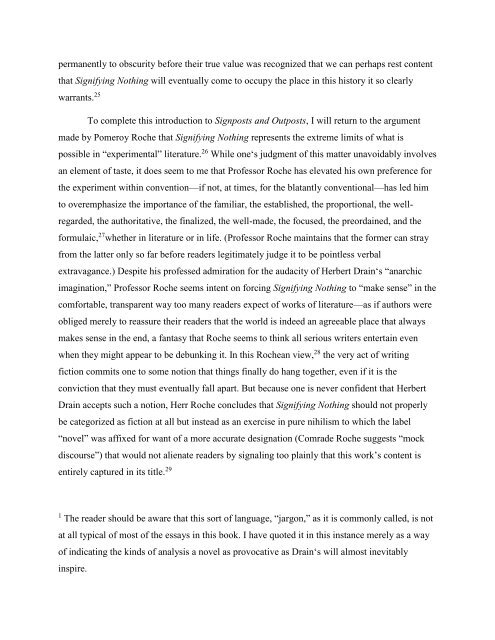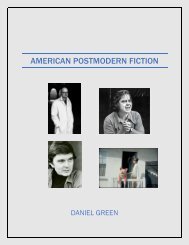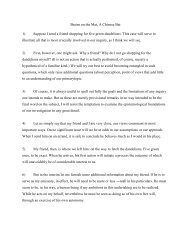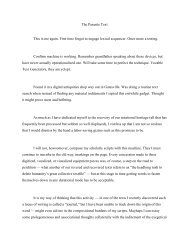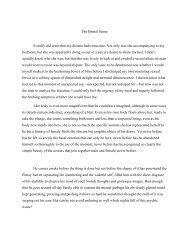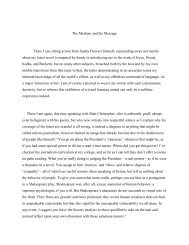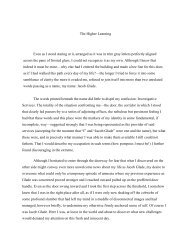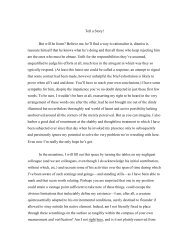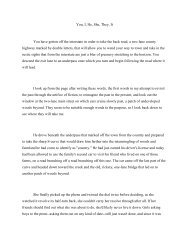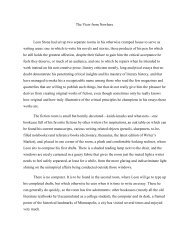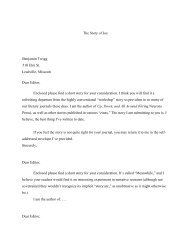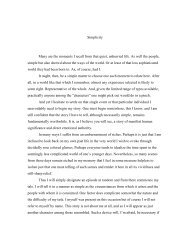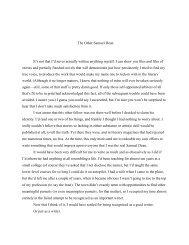Signifying Nothing
Create successful ePaper yourself
Turn your PDF publications into a flip-book with our unique Google optimized e-Paper software.
permanently to obscurity before their true value was recognized that we can perhaps rest content<br />
that <strong>Signifying</strong> <strong>Nothing</strong> will eventually come to occupy the place in this history it so clearly<br />
warrants. 25<br />
To complete this introduction to Signposts and Outposts, I will return to the argument<br />
made by Pomeroy Roche that <strong>Signifying</strong> <strong>Nothing</strong> represents the extreme limits of what is<br />
possible in “experimental” literature. 26 While one‘s judgment of this matter unavoidably involves<br />
an element of taste, it does seem to me that Professor Roche has elevated his own preference for<br />
the experiment within convention—if not, at times, for the blatantly conventional—has led him<br />
to overemphasize the importance of the familiar, the established, the proportional, the wellregarded,<br />
the authoritative, the finalized, the well-made, the focused, the preordained, and the<br />
formulaic, 27 whether in literature or in life. (Professor Roche maintains that the former can stray<br />
from the latter only so far before readers legitimately judge it to be pointless verbal<br />
extravagance.) Despite his professed admiration for the audacity of Herbert Drain‘s “anarchic<br />
imagination,” Professor Roche seems intent on forcing <strong>Signifying</strong> <strong>Nothing</strong> to “make sense” in the<br />
comfortable, transparent way too many readers expect of works of literature—as if authors were<br />
obliged merely to reassure their readers that the world is indeed an agreeable place that always<br />
makes sense in the end, a fantasy that Roche seems to think all serious writers entertain even<br />
when they might appear to be debunking it. In this Rochean view, 28 the very act of writing<br />
fiction commits one to some notion that things finally do hang together, even if it is the<br />
conviction that they must eventually fall apart. But because one is never confident that Herbert<br />
Drain accepts such a notion, Herr Roche concludes that <strong>Signifying</strong> <strong>Nothing</strong> should not properly<br />
be categorized as fiction at all but instead as an exercise in pure nihilism to which the label<br />
“novel” was affixed for want of a more accurate designation (Comrade Roche suggests “mock<br />
discourse”) that would not alienate readers by signaling too plainly that this work’s content is<br />
entirely captured in its title. 29<br />
1<br />
The reader should be aware that this sort of language, “jargon,” as it is commonly called, is not<br />
at all typical of most of the essays in this book. I have quoted it in this instance merely as a way<br />
of indicating the kinds of analysis a novel as provocative as Drain‘s will almost inevitably<br />
inspire.


